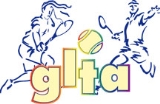
The Gay and Lesbian Tennis Alliance
Encyclopedia

See also
- LGBT community
- 2006 World Outgames2006 World OutgamesThe 1st World Outgames took place in Montreal, Quebec, Canada from July 26, 2006 to August 5, 2006. The international conference was held from July 26 to the 29. The sporting events were held from July 29 to August 5.-History:...
www.glta.net
The Gay and Lesbian Tennis Alliance (GLTA) is the international organization that manages and sanctions the gay tennis circuit around the world. Tournaments in Thailand, Éire and Australia were added to the portfolio of events in 2010 increasing the number of tournaments to 60 around the globe. Events range in size from less than 100 competitors to over 400. Between 9000 and 10000 registrations for GLTA sanctioned tournaments are forecast for 2010. Most tournaments encourage international participation by offering hosted (free housing) to visiting players. Players at all levels can compete within Open to D divisions determined by ability. Where possible, similar divisions are provided for 40yr + players. Tournaments take place on grass, clay and cement courts, depending on location.
Tournaments are usually organised at a local level by clubs and associations, whilst the GLTA provides technical and governance support and direction. The GLTA is not for profit organisation. At a the local level each tournament event raises funds for charitable causes.
The stated mission of the GLTA is to increase participation and diversity within the sport. Participation is not limited to the gay and lesbian community and all players are welcomed.
Homophobia continues to pervade the sport of tennis across the globe at all levels. A European Union report
states to be ‘open’ in sport risks harassment, homophobia or rejection from fellow club members. Whilst the report notes evidence of homophobia, particularly in Catholic Central and Eastern European nations, homophobia in sport is to be found in the "West" as well. During dinner at Yale University on Nov. 10 2009, tennis team members wearing women’s underwear and fishnet stockings posed as members of the Sigma Alpha Epsilon fraternity and entered several residential college dining halls. It was reported the team’s initiates had signs on their backs that read, “I’m a faggot. Insert Here”.
Unsurprisingly, there are no openly gay male tennis professionals on the ATP circuit and top lesbian sportswomen such as Mauresmo have been the subject of insult from the media, public and fellow players.
Against this backdrop, the GLTA is developing partnerships with sports bodies such as the United States Tennis Association (USTA) which have identified diversity as a worthwhile objective.
Recently the organisation has begun to formulate a financial and organisational support strategy to bring events to communities where the political, legal and cultural situation for gay and lesbians limits opportunities to compete in the sport without hiding their sexuality.
External links
- Gay and Lesbian Tennis Alliance — official website

